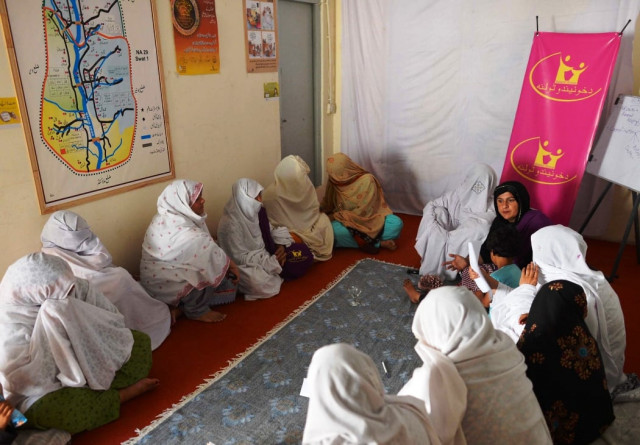Women’s jirga
Although jirgas are outlawed, support must be extended to such initiatives since they function as advocacy groups.

In this photograph taken on June 20, 2013 women attend a jirga in Saidu Sharif, the twin town of Mingora, the largest city in Swat. PHOTO: AFP/FILE
Tribal jirgas function as a parallel judicial system in the province where dissatisfaction with mainstream courts is common.
But, composed of tribal elders who are all men, these jirgas often hand out deeply misogynistic verdicts.
Rather than punishing the culprit, they often hand over women to the aggrieved party so that scores can be settled.
Thus, it is common for the women in the community to bear the brunt of any crime that a man commits.
The result is that women, who already suffer horrific abuse of rights, have to face further victimisation when they turn to the justice system for recompense.
The mainstream legal and judicial system does not present a solution either. Not only is the system corrupt, slow and inaccessible, the police blatantly discriminate against women and routinely refuse to record their statements or register their cases.
The formation of this jirga is an indication of the deterioration in women’s rights in the province. Female activists first sought entry into the male jirga, forming the female jirga only after they were rejected.
They claim to have helped in 11 cases involving abuse of women’s rights already. One of the most positive things about the female jirga is that it is not simply a parallel legal system; it is more of a support network for women, which helps them get recourse through conventional channels.
Although jirgas are outlawed and must ultimately be abolished, support must be extended to such initiatives since they function more as advocacy groups. At the same time, the government needs to strengthen its legal and judicial systems so that people turn to it for justice.
A crucial factor is training and sensitising the police in women’s cases so that, at the very least, they record statements and register cases.
Published in The Express Tribune, July 13th, 2013.
Like Opinion & Editorial on Facebook, follow @ETOpEd on Twitter to receive all updates on all our daily pieces.














COMMENTS
Comments are moderated and generally will be posted if they are on-topic and not abusive.
For more information, please see our Comments FAQ